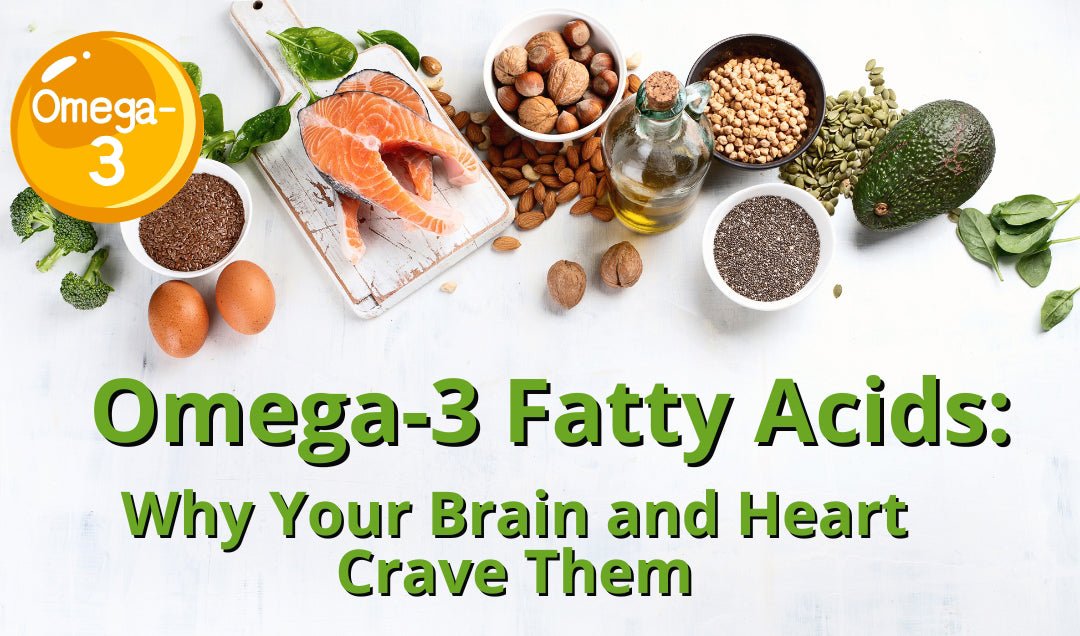Omega-3 Fatty Acids: Why Your Brain and Heart Crave Them

Omega-3 fatty acids, often hailed as essential nutrients, play a crucial role in maintaining the health of our body and mind. While they are well-known for their heart health benefits, their impact on brain function is equally significant. Let's dive into why these vital fats are so important for both your brain and heart.
Understanding Omega-3 Fatty Acids
Omega-3 fatty acids are a group of polyunsaturated fats that are essential for human health. They are termed "essential" because our bodies cannot synthesize them, necessitating their intake through our diet. The three main types of omega-3s include:
-
Eicosapentaenoic acid (EPA): Known for its anti-inflammatory properties, primarily found in fish and seafood.
-
Docosahexaenoic acid (DHA): Crucial for brain health, predominantly found in marine sources such as fatty fish.
-
Alpha-linolenic acid (ALA): A plant-based omega-3 that can be converted into EPA and DHA in small amounts, found in flaxseeds, chia seeds, and walnuts.
The Brain's Dependence on Omega-3s
DHA and EPA are particularly significant for brain health, contributing to various cognitive functions and overall brain maintenance. Here's why:
1. Neuroprotection and Functionality
DHA is heavily concentrated in the brain's grey matter and cell membranes, playing a key role in maintaining cell structure and ensuring efficient communication between neurons. It helps protect brain cells from inflammation and oxidative stress, promoting overall brain functionality.
2. Mood Regulation and Mental Health
EPA, in particular, has been linked to mood regulation. Studies suggest that optimal levels of EPA and DHA can help alleviate symptoms of depression and anxiety. They are believed to influence mood-related neurotransmitters like serotonin and dopamine, enhancing emotional well-being.
3. Cognitive Development and Aging
Omega-3s are vital from prenatal development through old age. Adequate DHA levels are crucial during pregnancy and early development, affecting children's cognitive performance and reducing the risk of neurodevelopmental disorders. In adults, these fatty acids may slow cognitive decline, reducing the risk of Alzheimer's disease and dementia.
Omega-3s and Heart Health
While omega-3s are significant for brain health, their benefits for the heart are well-established:
1. Reduction of Heart Disease Risk
Omega-3s contribute to heart health by lowering triglyceride levels, reducing blood pressure, and preventing blood clots. They help stabilize heart rhythms and reduce inflammation, a key factor in cardiovascular disease.
2. Improved Cholesterol Levels
These fatty acids increase levels of high-density lipoprotein (HDL), the "good" cholesterol, while lowering levels of low-density lipoprotein (LDL), thus contributing to healthier cholesterol profiles.
3. Enhanced Blood Vessel Function
EPA and DHA improve endothelial function, helping blood vessels relax and reducing the risk of atherosclerosis—the buildup of fats, cholesterol, and other substances in and on artery walls.
Incorporating Omega-3s into Your Diet
Given the myriad benefits, ensuring sufficient omega-3 intake is vital. Here are ways to incorporate them into your diet:
-
Eat fatty fish: Salmon, mackerel, sardines, and trout are excellent sources of DHA and EPA.
-
Include plant-based sources: Flaxseeds, chia seeds, hemp seeds, and walnuts provide ALA.
-
Consider supplements: Fish oil or algae-based omega-3 supplements can help, especially if you have dietary restrictions or need higher doses.
Conclusion
The craving of your brain and heart for omega-3 fatty acids is rooted in their profound impact on health. From enhancing cognitive function to safeguarding your heart, these essential fats are indispensable. By embracing a diet rich in omega-3s, you support both mental and cardiovascular health, paving the way for a healthier and more vibrant life.
The risk of heart disease and its multifaceted implications on human health have been at the forefront of medical research for decades. One significant factor influencing this risk is the level of omega-3 fats in the body. Omega-3 deficiency is linked to various health problems, including increased risk of heart disease, impaired brain development, and issues with blood flow. To counteract these deficiencies, omega-3 supplementation is often recommended.
Oily fish, such as salmon, mackerel, and sardines, are renowned for their high omega-3 content and are a staple in diets rich in healthy fats. These foods play an essential role in improving omega-3 levels in the body, contributing to a higher omega-3 Index, which is associated with better cardiovascular health and reduced risk of depressive symptoms. Additionally, plant sources like flaxseeds, chia seeds, and walnuts serve as valuable plant foods that can help boost omega-3 levels, albeit to a lesser extent than oily fish.
For those unable to consume fish, dietary supplements such as fish oil supplements, krill oil, and algae oil provide alternative means to increase omega-3 intake. These supplements are particularly beneficial for people with rheumatoid arthritis, as they can help modulate the immune response and reduce inflammation. The inclusion of these supplements as a daily supplement can also support blood clotting functions, a vital aspect of maintaining a balanced diet and a healthy diet overall.
Healthy brain development in infants and children is another area where omega-3 fats play a crucial role. Adequate consumption supports optimal brain structures and cognitive functions. As part of a balanced diet, ensuring sufficient omega-3 intake is essential not only for brain health but also for maintaining efficient blood flow and heart health.
On the other hand, the inclusion of artificial sweeteners and unhealthy oils, such as corn oil, in one's diet may undermine these health benefits. Therefore, emphasizing natural food sources and supplements free of additives is crucial for maximizing the positive effects on heart and brain health.
While White fish may not be as rich in omega-3 as their oily counterparts, they still offer valuable nutrients and can be included as part of a varied diet. For those managing autoimmune diseases, finding the right balance of omega-3 through a combination of dietary sources and supplements can significantly improve overall well-being.
In conclusion, a deliberate focus on increasing omega-3 intake through oily fish, plant sources, and supplements like krill oil or algae oil can profoundly impact heart health, brain development, and immune function, ultimately contributing to a reduced risk of heart disease and other chronic conditions.







